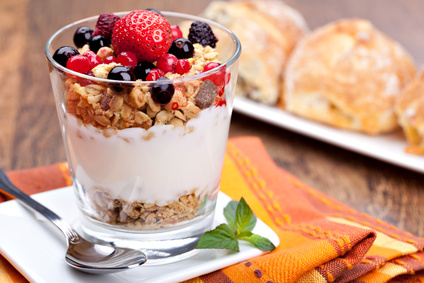Now that fall is in full swing and schedules are getting busy, don’t let breakfast be something you neglect to prioritize.
Most people I work with tell me they skip breakfast for one of 2 reasons: either they feel they don’t have time, or they don’t feel hungry in the morning. When it comes down to it, these are both excuses that just don’t hold up when you consider the health benefits of breakfast. I encourage individuals to make breakfast a priority daily. It really isn’t that hard, especially when you consider the following health consequences of skipping breakfast:
- You miss out on nutrients – People who skip breakfast generally fail to make up for the nutrients they’ve missed. As a result, breakfast eaters have better overall eating habits and higher intakes of protein, calcium, vitamin C, zinc, iron and fiber.
- It slows down your metabolism – Many people skip breakfast in an effort to lose weight. However, research says that those who skip breakfast are more likely to gain weight. Having a healthy breakfast within 2 hours of waking helps to “jump-start” your metabolism after a night of rest has allowed it to slow.
- It makes overeating more likely later in the day – Eating breakfast, especially a high protein breakfast with 20-30 grams of protein, stimulates a broad spectrum of satiety hormones that help control appetite and regulate food intake throughout the day. Those that skip breakfast will likely feel increased appetite later in the day, which sets them up for overeating especially in the evening.
- Performance and attention span suffer – Whether you’re headed off to work or school, research shows that skipping breakfast lowers academic performance and reduces attention span.
Now that I’ve establish the argument for why eating breakfast daily is best for our health, you may be wondering how to practically implement this habit. Here are my suggestions:
- You have to make it a priority. If you feel like you don’t have enough time in the morning, then get up 5 MINUTES EARLIER…that’s really all it takes.
- Plan ahead. Have quick, grab-and-go items available for those mornings you’re short on time.
- Aim for at least 2 food groups to be represented, but ideally 3 (protein, whole grain, and fruit tend to be the most common 3). Ideas include:
Protein
- Hard boiled eggs – Cook up a batch on Sunday to have around for the week
- Nuts or nut butters – pre-portion about ¼ cup into a small snack bag
- Dairy – Low fat options like yogurt/greek yogurt, string cheese, or cottage cheese.
Whole grains
- Whole wheat bread/toast
- Oatmeal – I like to cook my oats in the microwave for 6 minutes on 50% power. That way it won’t boil over, and I use those 6 minutes to continue getting ready for work.
- Whole grain breakfast cereal – Cheerios, Shredded Wheat, and Total are few of the many options. Look for “whole grain” as the first ingredient.
- Whole wheat bagel or whole wheat English muffin – Choose ½ or the whole depending on your calorie needs
Fruit
- Fresh, frozen, or dried (with no added sugar)
- Limit fruit juice to no more than ½ cup daily – it’s best to get your fruit from whole fruit.

My Top 3 Favorite Quick Breakfast Picks
- A slice of whole wheat toast with peanut butter, banana slices, and cinnamon on top (this is my go-to choice when I’m short on time).
- Oatmeal with berries and walnuts/almonds.
- Greek yogurt topped with fresh fruit and granola yogurt with muesli and berries in small glass.
Katie Sonnek, RD, LN
Registered Dietitian at Ridge Athletic Clubs
Subscribe to Katie’s monthly nutrition newsletter, The Dish, by clicking here!
